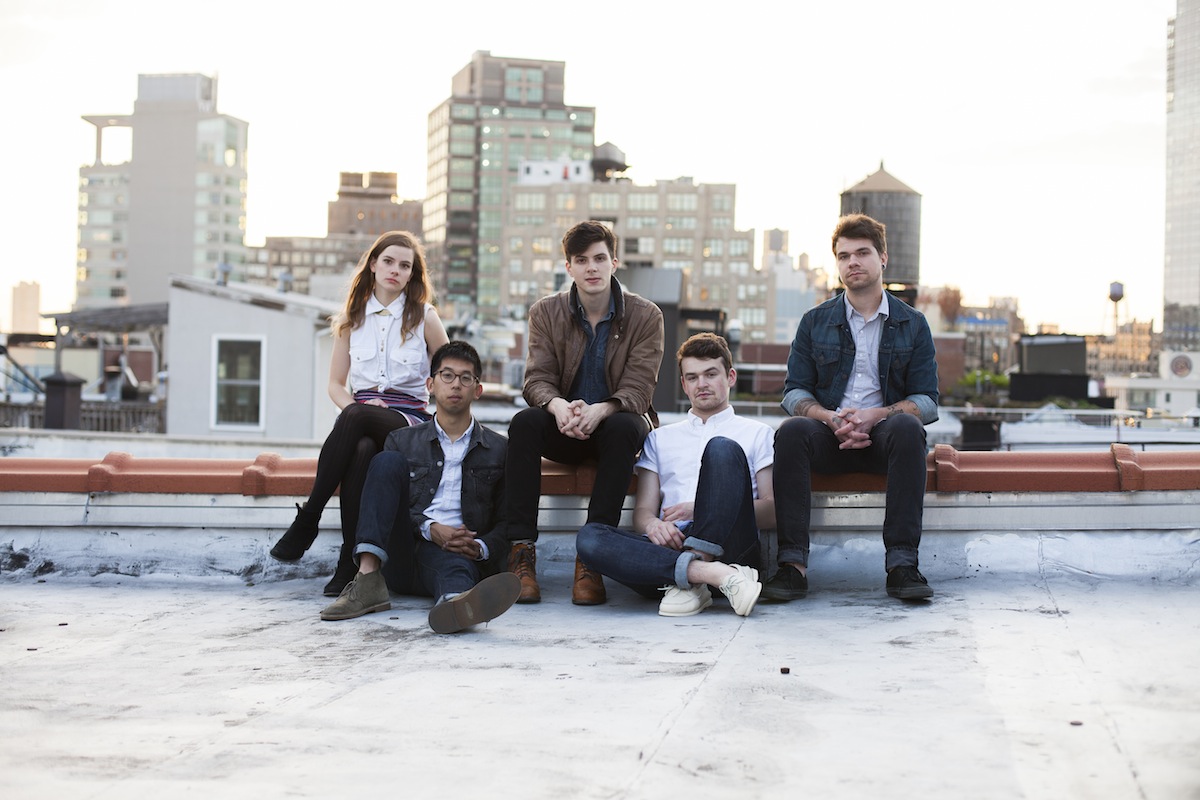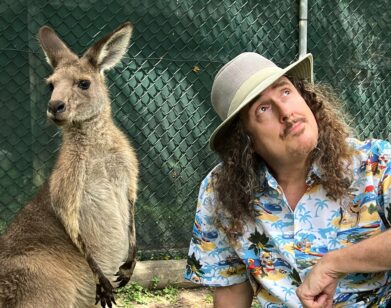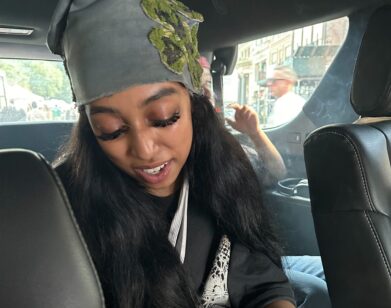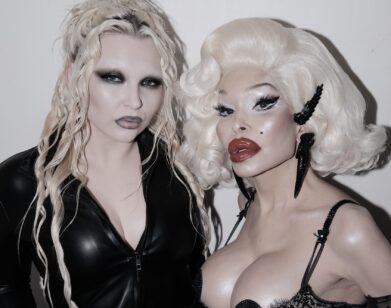Magic Man is Borderless

ABOVE: MAGIC MAN. PHOTO COURTESY OF GAVIN THOMAS
Magic Man is the kind of band that wants to take listeners places. A listen to its debut album, Before The Waves, reveals that everything worthwhile happens, adventitiously, in transit. Paris, Texas, Chicago, and southern France, where founding members Alex Caplow and Sam Lee spent an Indian summer working on organic farms, all play foil to themes of reconciling the lucid anxiety of nostalgia and growing up. On its 12-track debut, co-produced by Aldi Alex—who has mixed for the likes of Passion Pit, Theophilus London, and Holy Ghost!—the band baits with glimmering synth-pop hooks and reels inwards with infectious zeal; employing deliriously danceable, cinematic touches to underscore declarations of lost passion, regret, and keenness for the future.
It began in the summer of 2009, when Caplow and Lee, founding members and friends since pre-school, embarked on a post-freshman year Eurotrip. While traversing the various participating farms of WWOOF (World Wide Opportunities on Organic Farms) southern France had to offer, Caplan and Lee would race back to their bedroom each time inspiration for a song struck. As the summer wore on, the two excavated their own world of migrant bedroom pop, resulting in Real Life Color, a dreamily lo-fi first offering of songs that paid homage to The Postal Service and other artists of post-new wave, 21st century electro-pop. After adding their mutual high school and college friends Gabe Goodman, Joey Sulkowski, and Justine Bowe to the equation, two became five, honing a swirling live mix of effortlessly euphoric sounds referencing their love for live rock bands and computer-age, evocative music.
Interview caught up with Caplow, frontman and vocalist, and Lee, who plays keyboards and bass, just as they stepped off the plane in Los Angeles to promote Before The Waves before kicking off their summer tour. Our interview follows.

JOY SHI: Your music has been billed as “Bruce Springsteen for a generation raised on synth.” Given you graduated college in 2012, it seems more accurate to say that you grew up more surrounded by the rise and fall of bubblegum pop, pop-punk, and the infiltration of electronic dance into just about everything. What music actually influenced you growing up?
SAM LEE: In general, we both try to listen to a ton of different music; I am into Bruce Springsteen and also more recent bands like The Killers. The Killers were the first band I heard that were making alternative pop and rock that used synths in a way that became very popular with bands like MGMT and Passion Pit. The Postal Service is another great example of that. Those two bands were definitely big for us in high ’80s. Before that, we weren’t really listening to that kind of music as much, although the Eighties were a big influence on our sound.
SHI: The Postal Service I can definitely hear, especially on Real Life Color. It had that fuzzy, mid-’90s bedroom ambiance to it, and it made sense that it was birthed in the summertime in France while you both were in transit. But fast forward to your new album: the sound is so much more intentional and has lost most of that initial fuzz, and yet it still feels as if its existing in a dreamscape. Can you speak to that effect on listeners?
LEE: It was definitely a conscious decision to change the sound. Real Life Color we made by ourselves on our laptaps when we were traveling through France. Once we started playing live, we transformed the project from a duo into a five-piece because we found we really liked bringing that live rock band energy to the songs, even though they weren’t necessarily written that way. That really transformed the sound: we started writing new material with the full band in mind, a five-piece with live drums, live keys, live bass, while still trying to keep the atmosphere and layers from the Real Life Color style work. With Before The Waves we definitely thought about it more and came out of it a little more intentionally.
SHI: Seeing your live show at SXSW, it seemed like it was as much a cathartic experience for your band, from a performance side, as it was for your audience. Is there a correlation between this and why your new album is much more geared towards dancing—albeit the soft, chill-and-sway-and-smile kind?
ALEX CAPLOW: Definitely. One of my favorite artists is Robyn because her music is so dance-y, but it’s also so sad. When you’re dancing to Robyn it’s much more intense and cathartic than just dancing to a fairly happy, bubblegum pop song, because it brings up all the feelings. When we added more band members, we loved blending crazy, floaty bass into shows at house parties, where people had exactly the “cathartic, dance your emotions away” experience. So we decided to try and bring that into the new album and make it more immediately danceable. We do have a great time on stage at shows: it’s exercise as well as meditative.
SHI: Magic Man as it exists now began with two of you volunteering on an organic farm in the south of France. Was it your intention to start a new band at the time, or did it grow out of boredom or feeling displaced?
LEE: Honestly on most of the farms we were working at, because it was August in the south of France, it got so hot in the middle of the day that everyone would take sort of an extended lunch break. We’d use that time to start working on some songs. We definitely weren’t thinking about turning it into an album until we had about six or seven songs here, we’ve got two or three more and this could become something we could put out and release.
SHI: What motivated you to join WWOOF together initially?
LEE: Alex’s mother is French, so he’s fluent in French and has been going to France for his whole life. I had been studying the French language and was getting more interested in sustainable agriculture and farming, so it was a perfect opportunity. I was in Paris for a month before that, studying and taking French classes, and then met up with Alex. It’s a great way to travel because you can basically work five or six days a week in exchange for room and board, so once we got there it was a very cheap way to travel across the country.
SHI: Definitely, probably even cheaper than backpacking or similar.
LEE: Totally. We didn’t even pay for anything once we got out there. People were so nice; they’d give us rides to the next farm, help us out, and always wanted to show us the local delicacy or particular kind of cheese they were famous for. It was great, I would recommend it to anyone who’s looking for something interesting to do and likes being outdoors.
SHI: How was the farm work itself?
LEE: The funny thing is, we went into it open to learning more things about farming and ended up not doing a ton of farm work. One of the places we stayed was a bed-and-breakfast chateau and had a small garden. So we helped out in the garden and did various things around the property. Another big farm we stayed at was hosting a circus festival when we were there, so we didn’t end up doing much farming at all, because everything was focused on the circus. So we ended up volunteering at the festival and helping them set up, pitched a bunch of tents, worked at the circus bar, and did odd jobs; it was a very surreal lifestyle.
SHI: It seems that surreal feeling shows up in your music then and now; it doesn’t really feel connected or weighted down to any one place. Was this the circus where you met the magician you named your band after?
LEE: I would call him an aspiring amateur magician. [laughs] He was mostly a guy who was kind of doing the same thing that we were doing, hanging out at festivals, traveling from place to place and living a nomadic lifestyle, which was his whole life—and for us it was just for a summer.
SHI: What was his reaction to your music?
LEE: I think he said, “Sounds like Animal Collective.”
CAPLOW: Yeah, and we were shocked he knew what Animal Collective was, because we were in such a rural, random part of the south of France. It was one of the good compliments.
SHI: What did your hosts think of your music?
CAPLOW: I think they thought we were pretty strange. When we’d get really excited about a song, we’d run back to our bedroom to record things. They probably thought we were young lovers. [laughs]
SHI: That’s great. So you guys went from writing these songs in B&B chateaus and throughout France to collaborating with Passion Pit’s producer, Aldi Alex, on your new album. What was the biggest lesson you learned from him, or alternately what was the biggest thing his touch did for your music?
LEE: We worked with a bunch of different producers and had a really good connection with Alex. He got the songs as we imagined it sounding in our heads and what we couldn’t quite reproduce in our little home studio. This was the first time we really set out to make an album and working with someone who had done that before was really invaluable, in terms of not just “does the song work,” but also “does the song work with all the other songs.”
SHI: You’ve gone from ambient to much more energetic tangible dance music. What other corridors are you interested in exploring in the future?
LEE: Before The Waves caught us in our most maximalist stage. There were a lot of layers on Real Life Colors, but there were definitely elements of minimalism in the songwriting and a smaller, more intimate vibe to the songs. Recently we’ve been writing some more minimal, downtempo R&B-influenced stuff. We’re trying all sorts of different things and genres. Once we get into the phase of writing the second record, I’m excited to go with it.
BEFORE THE WAVES IS OUT TODAY, JULY 8; MAGIC MAN ALSO STARTS ITS SUMMER TOUR IN SAN DIEGO TODAY. FOR MORE ON THE BAND, VISIT ITS WEBSITE.






